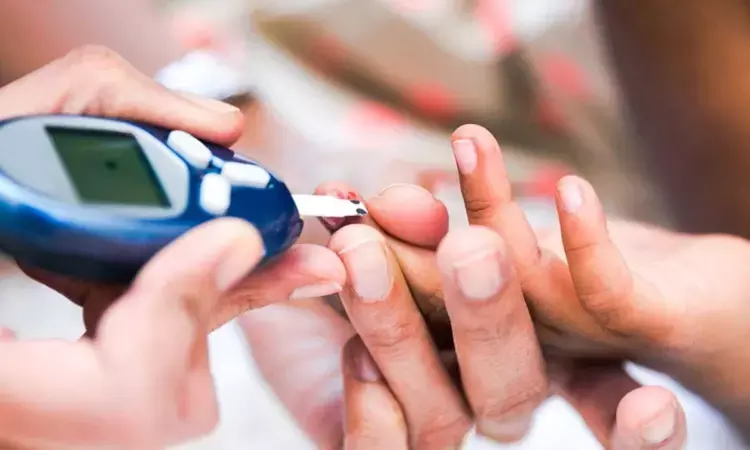- Home
- Medical news & Guidelines
- Anesthesiology
- Cardiology and CTVS
- Critical Care
- Dentistry
- Dermatology
- Diabetes and Endocrinology
- ENT
- Gastroenterology
- Medicine
- Nephrology
- Neurology
- Obstretics-Gynaecology
- Oncology
- Ophthalmology
- Orthopaedics
- Pediatrics-Neonatology
- Psychiatry
- Pulmonology
- Radiology
- Surgery
- Urology
- Laboratory Medicine
- Diet
- Nursing
- Paramedical
- Physiotherapy
- Health news
- Fact Check
- Bone Health Fact Check
- Brain Health Fact Check
- Cancer Related Fact Check
- Child Care Fact Check
- Dental and oral health fact check
- Diabetes and metabolic health fact check
- Diet and Nutrition Fact Check
- Eye and ENT Care Fact Check
- Fitness fact check
- Gut health fact check
- Heart health fact check
- Kidney health fact check
- Medical education fact check
- Men's health fact check
- Respiratory fact check
- Skin and hair care fact check
- Vaccine and Immunization fact check
- Women's health fact check
- AYUSH
- State News
- Andaman and Nicobar Islands
- Andhra Pradesh
- Arunachal Pradesh
- Assam
- Bihar
- Chandigarh
- Chattisgarh
- Dadra and Nagar Haveli
- Daman and Diu
- Delhi
- Goa
- Gujarat
- Haryana
- Himachal Pradesh
- Jammu & Kashmir
- Jharkhand
- Karnataka
- Kerala
- Ladakh
- Lakshadweep
- Madhya Pradesh
- Maharashtra
- Manipur
- Meghalaya
- Mizoram
- Nagaland
- Odisha
- Puducherry
- Punjab
- Rajasthan
- Sikkim
- Tamil Nadu
- Telangana
- Tripura
- Uttar Pradesh
- Uttrakhand
- West Bengal
- Medical Education
- Industry
Low-Dose Antithymocyte Globulin Effective in Preserving Beta-Cell Function in Type 1 Diabetes: Study

Belgium: A phase 2 international trial published in The Lancet has found that low-dose antithymocyte globulin (ATG) can slow the loss of insulin-producing beta-cell function in children and young adults recently diagnosed with stage 3 type 1 diabetes.
"Both 2.5 mg/kg and 0.5 mg/kg intravenous doses preserved C-peptide levels over 12 months compared with placebo, indicating that even a reduced dose of this immunosuppressing drug may help modify the course of the disease," Prof Chantal Mathieu, Department of Chronic Diseases and Metabolism, KU Leuven, Leuven, Belgium, and colleagues reported.
The MELD-ATG study enrolled participants aged 5 to 25 years who had been diagnosed with type 1 diabetes within the previous 3 to 9 weeks. Conducted across 14 centres in eight European countries, the double-blind, randomized, placebo-controlled trial used an adaptive design to identify the smallest effective dose of ATG.
Participants were stratified by age and randomly assigned to receive either a placebo or varying doses of the drug over two consecutive infusion days. All volunteers had at least one diabetes-related autoantibody and a minimum random C-peptide concentration of 0.2 nmol/L at baseline, a marker of residual beta-cell activity.
The study led to the following findings:
- A total of 117 participants were randomised: 31 received a placebo, 33 received 2.5 mg/kg ATG, and 35 received 0.5 mg/kg, with smaller numbers in the lowest and intermediate dose groups that were later discontinued.
- After one year, the 2.5 mg/kg ATG group showed a mean stimulated C-peptide AUC of 0.535 nmol/L per minute compared with 0.411 nmol/L per minute in the placebo group, a significant difference of 0.124 nmol/L per minute.
- The 0.5 mg/kg ATG group achieved a mean AUC of 0.513 nmol/L per minute, with a baseline-adjusted difference from placebo of 0.102 nmol/L per minute.
- Cytokine release syndrome was reported in about one-third of participants receiving 2.5 mg/kg ATG and about one-quarter of those given 0.5 mg/kg, but none in the placebo group.
- Serum sickness occurred in 82% of participants on the higher dose and 32% on the lower dose.
- No deaths or treatment-related life-threatening events were recorded.
The results suggest that antithymocyte globulin—commonly used to prevent organ transplant rejection—may be repurposed at a lower dose to protect remaining pancreatic function soon after type 1 diabetes diagnosis. By preserving the body’s own insulin production for longer, such an approach could reduce dependence on injected insulin and help stabilize blood glucose levels.
Investigators note that the adaptive design allowed efficient dose selection and demonstrated that 0.5 mg/kg provides a balance of efficacy and tolerability.
"Larger and longer-term studies will be needed to confirm whether this lower dose can deliver durable clinical benefits and to refine strategies for integrating ATG into early treatment plans. For now, the findings offer hope for a disease-modifying therapy in a condition where none currently exists," they concluded.
Reference:
Mathieu, C., et al. (2025). Minimum effective low dose of antithymocyte globulin in people aged 5–25 years with recent-onset stage 3 type 1 diabetes (MELD-ATG): a phase 2, multicentre, double-blind, randomised, placebo-controlled, adaptive dose-ranging trial. The Lancet. doi.org/10.1016/S0140-6736(25)01674-5.
Dr Kamal Kant Kohli-MBBS, DTCD- a chest specialist with more than 30 years of practice and a flair for writing clinical articles, Dr Kamal Kant Kohli joined Medical Dialogues as a Chief Editor of Medical News. Besides writing articles, as an editor, he proofreads and verifies all the medical content published on Medical Dialogues including those coming from journals, studies,medical conferences,guidelines etc. Email: drkohli@medicaldialogues.in. Contact no. 011-43720751
Next Story


